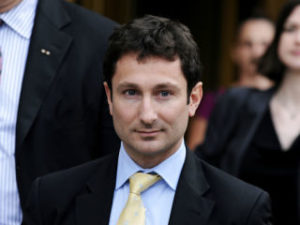 I recently participated in a poetry reading on the themes of money, “the market”, and values.[1] The reading inspired in me two things. First, a wistful musing on the value of words. Second, a deeply unpopular view of supposed Wall Street crimes that will make you hate me.
I recently participated in a poetry reading on the themes of money, “the market”, and values.[1] The reading inspired in me two things. First, a wistful musing on the value of words. Second, a deeply unpopular view of supposed Wall Street crimes that will make you hate me.
Wistful musing
One question occurred to me before and during the reading: What monetary value do words have?
Few poets, I assume, denigrate words by assigning a specific monetary value like we would to coins or currency. How base, to assign a financial measurement, a weight to these infinitely flexible materials of art!
And yet, what poet has not at some point lamented the lack of financial reward for her craft? Ever the contrarian, I decided to look for the most valuable word combinations on the planet.
At the reading, I recalled this semi-infamous piece of poetry from the year 2000.
“LFMN at $4. I can’t believe what a POS[2] that thing is. Shame on me/us for giving them any benefit of the doubt.
ATHM is such a piece of crap
No helpful news to relate [regarding ICGE], I’m afraid. This has been a disaster – There really is no floor to the stock”
Those lines were worth $104 million in 2002.
The author, Henry Blodget, personally paid $4 million and pled guilty to securities fraud and agreed to a lifetime ban from the industry. The other $100 million came from his former employer Merrill Lynch.
That proved to be a valuable word combination indeed.[3]
Here’s another centaur work, half-poetry, half-prose from 2007, written by Fabrice “Fabulous Fab” Tourre, a Goldman VP who structured mortgage CDOs:
“More and more leverage in the system, the whole building is about to collapse anytime now…Only potential survivor, the fabulous Fab…standing in the middle of all these complex, highly leveraged, exotic trades he created without necessarily understanding all of the implications of those monstrosities!!!”
And another from the same author:
“When I think that I had some input into the creation of this product (which by the way is a product of pure intellectual masturbation, the type of thing which you invent telling yourself: “Well, what if we created a “thing,” which has no purpose, which is absolutely conceptual and highly theoretical and which nobody knows how to price?”) it sickens the heart to see it shot down in mid-flight…it’s a little like Frankenstein turning against his own inventor ;)”] [4]
Those words, coupled with a few others memorialized in emails and congressional exhibits, cost Goldman Sachs $550 million to settle a civil lawsuit in 2010.
Those are some of the most valuable word combinations ever, no?
 Tourre himself paid $850,000 and later enrolled in an Economics PhD program at the University of Chicago.[5]
Tourre himself paid $850,000 and later enrolled in an Economics PhD program at the University of Chicago.[5]
Prosecution by words
One of the tropes of our post-Great Recession era is how disappointingly few – ok, the number is zero – executives of major Wall Street were prosecuted or went to jail. Markets crashed, trillions in dollar value disappeared, hundred of billions of taxpayer money bailed out Too Big To Fail Banks, millions lost their jobs, and then: nobody went to jail.
You might have your explanation for that result. I might have mine.
You might see the lack of criminal prosecutions of financial executives as a sign that “the system is rigged” in favor of the rich and powerful.
I don’t disagree that the world favors the rich and powerful. This rigging includes aspects of our own modern criminal justice system. But I disagree that this explains the lack of Wall Street prosecutions.
Ok, now you’re going to hate me. The real reason no one went to jail is because Wall Street executives didn’t actually commit any crimes. The cases against Blodget and Tourre – the finance poets quoted above – were absurd. These were mid-level folks doing their job, which often meant selling products they weren’t fully enamored with. Every finance person I’ve ever known, myself included, has done this. I assume most salespeople, in any industry, have done this. I mean, have you tried to buy a car, ever? The mistake Blodget and Tourre made was two-fold: First, having independent thoughts about their products, and second, writing them down.
 We have developed a regulatory tradition in the United States of punishing Wall Street through embarrassing email disclosure.
We have developed a regulatory tradition in the United States of punishing Wall Street through embarrassing email disclosure.
The pattern goes like this:
- The market crashes in a particular sector. Like tech in 2000. Or mortgage CDOs in 2008
- The public seeks a scapegoat for their losses
- Prosecutors and regulators subpoena all emails of Wall Street professionals in that investment sector
- Some 29-year-old Vice President at a major Wall Street firm is found to have written an unwise disparaging comment about an investment in that sector two years ago.
- Wall Street firms’ lawyers humbly approach prosecutors and ask “how much?”
- Wall Street firm pays hundreds of millions, maybe even a few billion, says sorry, VP is fired.
- The public is mollified, Wall Street firm is relieved, the shares rally.
The fact that Fabulous Fab knew his CDOs were ridiculous derivatives doesn’t distinguish him from many other salespeople in many industries selling products they don’t have 100 percent confidence in. The fact that Henry Blodget knew the internet dogs his company touted were flawed makes him insightful rather than criminal, in my book.

The tradition of settlement-by-embarrassing-email leaves me dissatisfied. I’m embarrassed for the poor 29-year-old Vice President who didn’t heed the very clear order from training class to never write down anything that you don’t want to read in the headlines of a daily newspaper. I’m annoyed with the lawyers at the enforcement agency, who rely on a “gotcha” email to win a big financial settlement with Wall Street – in a way that often misses the bigger picture.
Gotcha emails distract from this bigger picture: It should not be a crime to express doubts about your product. Any intelligent person who spends time among risky investments constantly questions their investments, their own products included And yes, I understand this is a deeply unpopular view.
More importantly, gotcha emails lull us into thinking that regulators are doing their jobs. They keep us from asking important questions like how to shrink Too Big To Fail banks. Those who wrote the costly poems above no longer work on Wall Street, for example, but the sudden demise of those banks might still crash our system.
And finally, one more question: why aren’t ordinary poets paid more for their words?
I just also needed an excuse to post this video.
[1] If you’re curious, the main reading was from The Market Wonders by Susan Briante, which I reviewed on my site.
[2] “Piece of Slime?” Who knows?
[3] As a footnote to the story and in the interest of full disclosure, Blodget later became editor-in-chief of the successful finance tabloid Business Insider, which used to pick up my writing online.
[4] Another word crime: Fabulous Fab misuses the reference. C’mon man, Frankenstein is the name of the inventor, not the monster.
[5] In the interest of full disclosure, I worked at the same firm and tried my best to sell Mortgage CDOs a few years before that, but I never overlapped with Fabulous Fab.
A versions of this ran in the San Antonio Express News and Houston Chronicle
Please see related post:
Book Review of The Market Wonders by Susan Briante
Four Factors Favoring Fabulous Fab
Post read (364) times.

